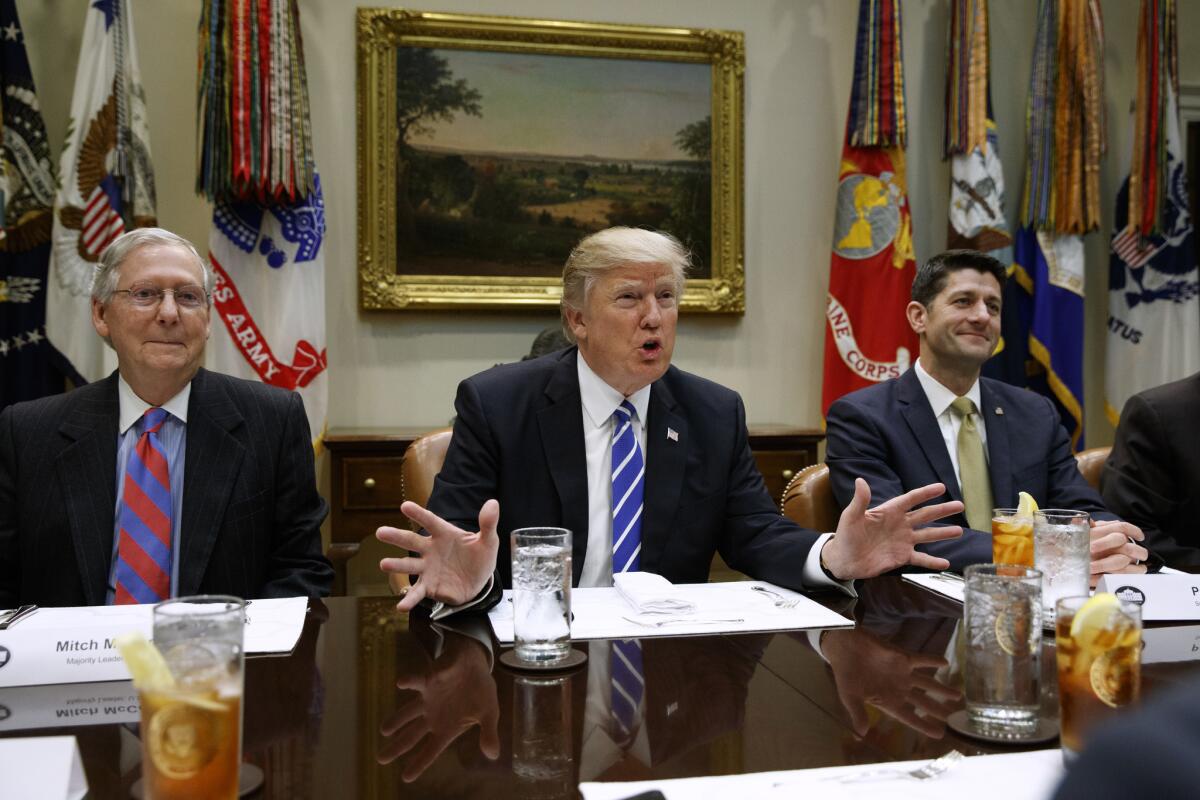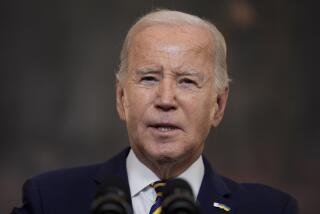Trump threatens to leave Obamacare in place if GOP bill fails

Reporting from Washington â House GOP leaders postponed a much-anticipated vote Thursday on legislation to overhaul the Affordable Care Act amid a Republican revolt that raised doubts about the fate of the measure as well as President Trumpâs self-proclaimed negotiating skills.
After initially vowing to continue talks through the night, a frustrated White House told a group of GOP lawmakers meeting in the Capitol basement Thursday evening that negotiations were âdoneâ and a vote would take place Friday.
If the bill is defeated, Trump threatened to simply leave the current healthcare law in place and move on to other issues, according to a message delivered by the presidentâs budget chief, Mick Mulvaney, according to Rep. Chris Collins (R-N.Y.).
âThe message is tomorrow itâs up, itâs down â we expect it to be up â but itâs done tomorrow,â Mulvaney said Thursday night.
It remained unclear whether Trumpâs extraordinary ultimatum was real or a pressure tactic designed to bring unruly Republicans in line.
Despite personal appeals from the president and a flurry of last-minute negotiations with House Speaker Paul D. Ryan (R-Wis.), wary GOP lawmakers remained unconvinced, leaving leaders shy of the votes needed to advance the legislation.
Conservatives argued the bill did not go far enough in dismantling the healthcare law known as Obamacare and were pushing to remove a key provision of the current law that requires health plans to cover a basic set of benefits.
Centrist Republicans, including many from districts that Trump lost in the November election, were worried about projections that 24 million more people would be without health coverage under the GOP bill.
âThe problem we have right now is nobody likes this bill,â said Rep. Raul R. Labrador (R-Idaho), a leading conservative. âThe majority of Americans donât like this bill, and the majority of Republicans in our districts donât like this bill. Letâs make it a bill we can all be proud of.â
Options for generating more support appeared limited because making concessions to one faction risked losing support from the other. Efforts were complicated by resistance in the Senate, where Republicans have largely panned the House package as unacceptable.
For lawmakers, the delay meant more time to be hammered by advocacy groups from all sides. Leading patient advocates, physician groups and hospitals have bombarded them with dire warnings about the erosion in coverage. Business groups have lined up on both sides of the bill; conservative organizations backed by the Koch brothers, which oppose the bill as too weak, pledged political ad campaigns to encourage votes against the measure.
The decision to cancel the vote leaves in limbo Trumpâs bid to quickly scrap his predecessorâs signature healthcare law and deliver on his partyâs long-running campaign promise. The Thursday vote had been purposefully scheduled for the lawâs seven-year anniversary.
At the White House, Trump â whose popularity is sagging amid an FBI investigation into possible collusion between Russia and his presidential campaign â had hoped that a decisive victory in the effort to repeal Obamacare would provide political momentum to propel other ambitious efforts, such as overhauling the nationâs tax code, pursuing new trade deals and dramatically scaling back federal spending in many areas.
The president made a hard sell in recent days, warning Republicans they risked losing their congressional majority in the next election if they failed to support the bill.
But Trumpâs struggle to deliver, which seemed complicated at times by his lack of understanding of the complexities of the healthcare legislation, threatened to tarnish his image as a deal-maker.
âRookieâs error, Donald Trump,â said House Minority Leader Nancy Pelosi (D-San Francisco), who ushered passage of the Affordable Care Act under President Obama. She mocked Trump for scheduling a vote before the votes were lined up.
The conservative House Freedom Caucus â which had been somewhat overshadowed by Trumpâs rise in recent months â led the opposition, reestablishing itself as one of the partyâs most formidable power centers.
Backed by GOP Senate allies, including Ted Cruz of Texas and Rand Paul of Kentucky, the caucus at times bypassed Ryan and negotiated directly with the White House.
Trump voters would be among the biggest losers in Republicansâ Obamacare replacement plan Âť
The vote delay raised familiar questions about who is in control of the Republican Party and dealt an embarrassing setback to Ryan. Facing solid opposition from Democrats, the speaker must rely on the GOP majority for passage and can lose no more than about 21 Republicans. Defections at one point this week spilled beyond 30.
Republican leaders worked late into the night to cut a deal with the caucus. Conservatives wanted a full repeal of the Affordable Care Actâs mandates, including 10 essential health benefits, such as maternity coverage, that insurers are required to provide.
While the White House appeared willing to compromise, the caucus splintered Thursday, and Trump was unable to close the deal with them.
Some members of the group complained the compromise did not go far enough to meet their concerns. âThey havenât met us at all,â said Rep. Paul Gosar (R-Ariz.).
Others wanted to simply start the legislative process over. âThereâs a split,â acknowledged Rep. Morgan Griffith (R-Va.), who is among the few from the group backing the new bill.
Rep. Mark Meadows (R-N.C.), the House Freedom Caucus chairman, was hopeful a deal would be reached. âNo deal yet, but negotiations havenât stopped. Rep. Meadows remains hopeful and will continue working,â his spokesman said on Twitter.
One amendment expected to be offered Friday in an effort to appeal to conservatives would abandon essential benefits mandated in Obamacare for insurance policies.
But in a twist sure to anger many Republicans, the amendment will also keep Obamacareâs 0.9% tax on high-income earners for six more years to generate an additional $15 billion for a state flexibility fund for patients.
In a bid to get votes, House Republicans prepare changes to their bill rolling back Obamacare Âť
It was unclear Thursday night whether Trumpâs ultimatum would work. Some critics reiterated their opposition after his announcement. But supporters predicted the presidentâs pressure would bring passage.
At the basement meeting Thursday evening, a few GOP lawmakers became emotional at the prospect of finally repealing a law theyâd targeted for years.
Moderate Republicans, meanwhile, continued to track the changes, worried that the bill might be dragged too far to the right. A new analysis released Thursday from the nonpartisan Congressional Budget Office showed changes so far would still leave 24 million more Americans without insurance, but would only reduce the deficit by half as much as initially proposed.
The House reform bill would roll back more than $1 trillion in federal aid, including nearly $900 billion in funding for Medicaid health insurance programs for the poor.
âLetâs do this right,â said Rep. Daniel Donovan (R-N.Y.), who opposed it. âI represent 740,000 people who are going to be harmed more than they will be helped by the current proposal.â
Times staff writer Brian Bennett contributed to this report.
ALSO
Obamacare repeal threatens health programs just as theyâre starting to work
Hereâs why the GOP is struggling to come up with a new healthcare plan: That wasnât the goal
More coverage of politics and the White House
UPDATES:
7:30 p.m.: This story was updated with additional details from Thursday nightâs meeting of Republicans in the Capitol basement.
5:30 p.m.: This story was updated after Trumpâs ultimatum.
This story was originally published at 4:50 p.m.
More to Read
Get the L.A. Times Politics newsletter
Deeply reported insights into legislation, politics and policy from Sacramento, Washington and beyond. In your inbox three times per week.
You may occasionally receive promotional content from the Los Angeles Times.












